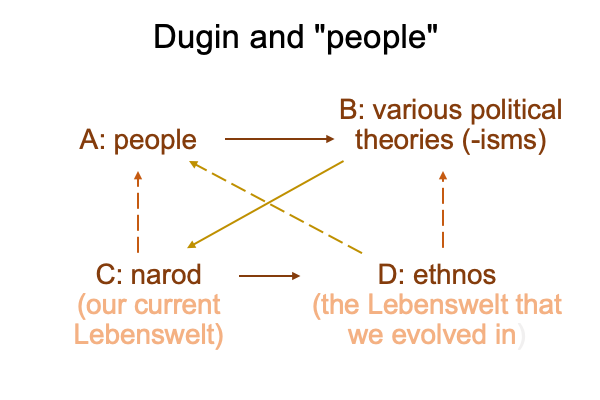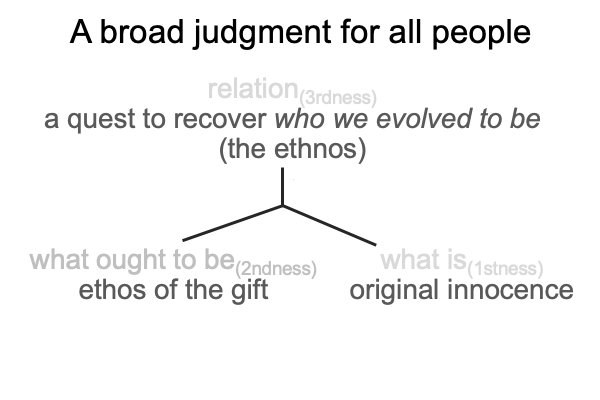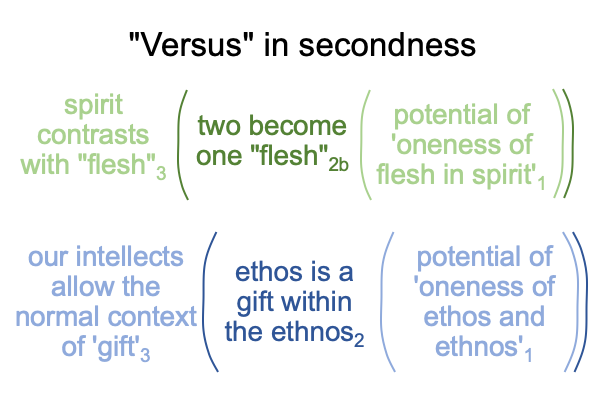0041 Secondness is the dyadic realm of actuality.
Looking back at the Greimas square for Alexander Dugin’s political theology, modern political theories (B, which, by the way, have all failed, each in its own way) extract an actuality from the narod (C, the pre-political and post-lapsarian adamah) and elevate that actuality into a normal context for a people (A). So, modern political theorists, like the magicians at the employ of Pharaoh at the time of Moses, also perform transubstantiations.
0042 Once again, here is a picture.

0042 Against modern materialist -isms, Pope John Paul II offers a holistic theology that may turn the narod (of Christ) into a people (under the banner of Christ the King). The blessed, honest Christian intellect offers a quest to recover (or, for modernity, to discover) who we evolved to be.

0043 That quest (relation, thirdness) brings the ethos of the gift (what ought to be, secondness) into relation with original innocence (what is, firstness).
The “gift” is theologically rich. One offers a gift. One receives a gift. One does not refuse a gift. Indeed, to accept a giftis a gift, as well. Plus, the gift of not refusing a gift cannot be refused, because the gift is… well… unstoppable.
0044 Of course, if the laws of noncontradiction are applied to the gift, consistently, and gratitude becomes obligation, then the fate of the gift may draw people into a web of obligations leading to a horrible fate.
Consider how uranium can be an inexpensive agent for producing electricity or an expensive agent to reduce military targets to rubble. What gift can be more wonderful and more horrifying? Yet, international markets trade this giftroutinely.
0045 Think of how much more wonderful and horrifying the actuality of two becoming one “flesh” can be.

0046 What does “flesh” mean?
Pope John Paul II contrasts “flesh” with “spirit”.
Two becoming one “flesh”2 occurs in the normal context of the spirit3 and arises from the potential of ‘oneness’1. Otherwise, the two are just “playing house”.
The gift of one lover giving himself to the other lover, who gives herself to the one lover, also manifests as the gift of life. Each child is a gift. The narod (and the ethnos) recognize children as gifts, not of human ceremonial exchange, but of divine beneficence. Grace inflows nature.
0047 So the potential of ‘oneness1 of flesh2 in spirit’3 corresponds to grace flowing into human nature.
The “gift”, then, exemplifies grace inflows nature.
0048 Humans intuitively recognize the nature of gifts. There is nothing like a gift from God. There is nothing as welcome as a gift from a fellow human.
Our innate ability to recognize a gift is an adaptation. In this adaptation, we anticipate the ethos of the gift (like grace) to flow into the ethnos (like nature). What is the result? Humans in the Lebenswelt that we evolved in are happy, in ways that civilized folk find hard to imagine. They own nothing. They are happier than any civilized person that owns something.
0049 Which makes me wonder, is “ownership” somehow different than the “gift”?
Uh-oh, isn’t ownership one of the conditions for civilization?
See Comments on David Graeber and David Wengrow’s Book (2021) “The Dawn of Everything”, by Razie Mah, available at smashwords and other e-book venues. Chapter ten of this book is examined in Looking at David Graeber and David Wengrow’s Chapter (2021) “Why the State has no Origin”, appearing in Razie Mah’s blog from March 15-31, 2023.
0050 The explicit abstractions afforded by speech-alone talk toy with our minds. The ethos of the gift (like grace) flows into the ethnos (like nature). As far as the human intellect3 is concerned, the gift2 arises from the potential oneness of what we give and receive and who we evolved to be1.
As far as the modern intellect is concerned, grace is one thing and nature is another. The notion that grace and nature are contiguous is ridiculous. Two options are available. Either grace rules and God manipulates nature to His ends or nature rules and God’s grace is a nice idea to pray over. Once “grace” and “nature” are no longer contiguous, then the gift-recognizing nature of the human becomes subject to analytic dissection, resulting in various -isms that theorize about what we ought to be giving and receiving and who we are.
